Kay Simon, Chinook Wines
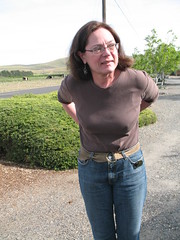 Over the mountains and through the high desert went Maggie and I last week to the expansive Yakima Valley. The Yakima doesn't share the press that Walla Walla gets, and that's so not fair, since a fair portion of wineries in the latter and elsewhere purchase fruit from it. It's Bordeaux variety country: Merlot, Cabernet Sauvignon and Sauvignon Blanc a-plenty. But, who's that, hiding in the corner? Is that you, Cabernet Franc? C'mere, you. Don't be shy. Your flashier bretheren always get the attention, but it's your dusty dried flower and bright fruit goodness that I love.
Over the mountains and through the high desert went Maggie and I last week to the expansive Yakima Valley. The Yakima doesn't share the press that Walla Walla gets, and that's so not fair, since a fair portion of wineries in the latter and elsewhere purchase fruit from it. It's Bordeaux variety country: Merlot, Cabernet Sauvignon and Sauvignon Blanc a-plenty. But, who's that, hiding in the corner? Is that you, Cabernet Franc? C'mere, you. Don't be shy. Your flashier bretheren always get the attention, but it's your dusty dried flower and bright fruit goodness that I love.Kay and Clay Simon have a nice chunk of Cab Franc in the front of their Chinook Winery in Prosser, and I'm not the only one eyeing it lovingly. A rather fat bird sits in a nearby branch as if determined to wait there clear through to harvest time to get his share. Kay tells me the birds---and even the dogs---love to munch the berries off the vines.
Chinook Winery makes a bit of all the Bordeaux varieties plus Chardonnay, but it's the Franc I'm most interested in. The Simons make both a red and rose from it. I tried the red, and am ready to testify. It's brimming with Franc-alicious charm. And as the brawniest Golden Retriever I've ever seen glued himself to my thigh, I sat down with Kay for a chat about it.
Interview with Kay Simon, Chinook Winery
C&D: Tell how you started making wine.
Kay: My dad made homemade wine with friends. I was raised in Northern California...my parents drank wine with dinner. That was not uncommon, in the sixties and seventies in California, to have wine with a meal. Not fancy wine, but wine with the meal. So that was something I observed in my childhood. In high school I worked with a public health nutritionist, and at that point I identified...that could be a profession I could follow, nutrition and food.
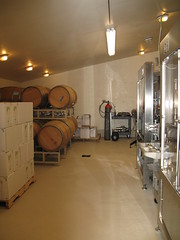 I ended up going to UC Davis to study nutrition, and during my convoluted path that most young people take, I decided that the malting and brewing class would be really fun to take, I love beer. Many of my classmates were also involved in wine classes, so I discovered that there was a major I could move to. I had all the chemistry already, organic microbiology and all that you need. So I changed my major to fermentation science. Graduated with that degree, got a job right away with a large winery. Then in the late seventies I got a job with Chateau St. Michelle here in Washington, they were expanding, they'd been purchased by U.S. Tobacco Company, and they hired a lot of young people with wine industry qualifications. That's where I met my husband Clay. In 1983 we started Chinook with no money and lots of ideas.
I ended up going to UC Davis to study nutrition, and during my convoluted path that most young people take, I decided that the malting and brewing class would be really fun to take, I love beer. Many of my classmates were also involved in wine classes, so I discovered that there was a major I could move to. I had all the chemistry already, organic microbiology and all that you need. So I changed my major to fermentation science. Graduated with that degree, got a job right away with a large winery. Then in the late seventies I got a job with Chateau St. Michelle here in Washington, they were expanding, they'd been purchased by U.S. Tobacco Company, and they hired a lot of young people with wine industry qualifications. That's where I met my husband Clay. In 1983 we started Chinook with no money and lots of ideas.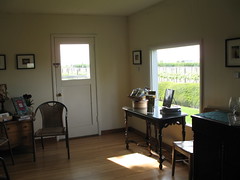
What do you grow onsite?
We grow Cabernet Franc, and we have long term arrangements with eight local growers, all within about fifteen miles from where you're sitting.
Do you have control over picking schedules?
Yeah. That's pretty typical, that you drive the schedule. It has to be a two-way street, obviously. If we say we want the grapes picked on Tuesday, they can say, on Tuesday I'm picking for L'Ecole, what about Monday. We have a relationship with growers based on mutual respect. And the other aspect of that relationship is, they don't want to take the liability in deciding when to pick. They'd much rather we be the ones that determine it.
You guys like Cabernet Franc a lot.
We do. We'd been introduced to some foreign made Cab Francs that we like, and some from California. Also because of this particular site, which we chose more as a winery location than a vineyard location. It's a little bit north-facing and a little cool. So Clay thought we could probably ripen Cab Franc here more successfully than Merlot or Cabernet Sauvingnon.
What do you drink at your own table?
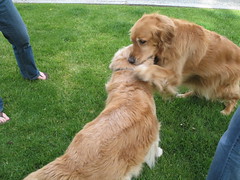 We drink some of everything. When we make that weekly trip to Seattle, one of us has the shopping assignment...sometimes, it's something typical of the blend we're working on. And then, the people who sell our wine, what are they excited about? It's interesting to know that, too.
We drink some of everything. When we make that weekly trip to Seattle, one of us has the shopping assignment...sometimes, it's something typical of the blend we're working on. And then, the people who sell our wine, what are they excited about? It's interesting to know that, too.Last question: terroir. Do you have any thoughts on it?
I hate the word. I think that wines should express the place that they come from.
What do you hate about the word?
It's pretentious to me to use a word that has meaning in a foreign language that doesn't really have meaning in our language. And the way I hear it used. And in terms of the science of it, what are you really talking about? Are you talking about the weather? Climate, rainfall? It's imprecise. So it's like, what's the question? If it's should the wine express the place that it comes from, in a multitude of ways, the answer is yes.
*****
Alas, Maggie and I parted ways (after watching Lord of War in a hotel room...Nick Cage is so awsesome...) and while she headed back to lovely Seattle, I forged on to Walla Walla. Up next: Jean-Francois Pellet of Pepperbridge and Amavi Cellars talks sustainable farming and how a Swiss fella ends up in Washington state.
Clinkies.
Clinkies.

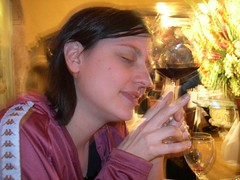



0 Comments:
Post a Comment
<< Home